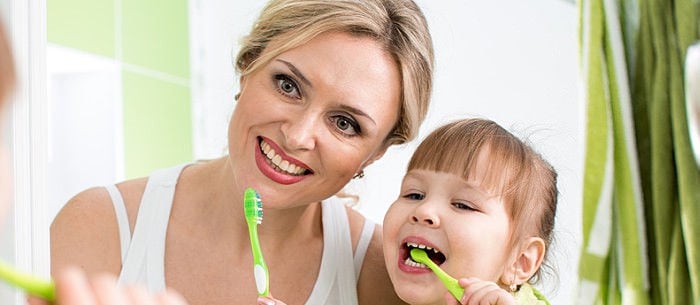Making hygiene for kids a part of your toddler’s daily routine can be … well, a little messy, especially when cleanliness and germs are the last thing on his mind. But introducing hygiene to your child doesn’t have to be a challenging experience.
Here are some tips and guidelines to help you get started:
The Best Time to Start
Nichole M. Turmelle, a supervisor of occupational therapy at the Children’s Specialized Hospital in New Jersey, says your child should be ready to start washing his hands at 2 to 2 1/2 years old, bathing himself with assistance at 3 to 3 1/2 years old and independently at 4 to 5 years old. Typically, a child can brush his teeth around 3 1/2 to 4 years old, put a comb to his hair at 3 to 3 1/2 years old and thoroughly brush his hair around 4 or 4 1/2 years old.
Turmelle says, “Toddlers and preschool-aged children learn appropriate hygiene skills through modeling, practice and routines.” The best teaching occurs during daily routines that encourage children to practice their developing skills.
Washing Hands
In addition to modeling and establishing routines for your child, you can often use children’s songs to help maintain a child’s interest in an activity for a period of time. This technique works particularly well when teaching hand-washing. Turmelle says, “Typically, the ABC’s song will last approximately 20 seconds, which is the CDC-recommended duration to lather when washing hands.” Partnering up with your child’s day care and finding out what methods they use to teach good hygiene practices to your child can also be helpful, so you can reinforce what he is learning at home. Parents are the first and most important teacher a child has, and when it comes to learning hygiene for kids, consistency is key.
Taking a Bath
Turmelle encourages parents to break down tasks into very small pieces that a child can learn and build on as he masters each section. For example, she says, “When a child is learning to bathe, focus first on having them practice washing their arms and parts they can see. Once they have mastered the arms, have them move to the legs, and so on until they are washing more independently.” She also suggests using motivating toys, soap or towels to help engage him in the task and provide cues — verbal and touch — to help him see what is still dirty.
For more on baths, check out Bathtime for Kids 101.
Brushing Teeth
Many toddlers like to be independent and do things on their own, and brushing his teeth is a great opportunity to give your child a little more independence. Turmelle suggests engaging your child in a “first you, then me” technique to allow him opportunity to gain independence, followed by parental assistance to ensure thoroughness. “Allow your child to look in the mirror and practice,” she says. “Help them put the brush on the teeth and let them practice the back-and-forth motion. Use counting, such as 1 to 10, to encourage your child to continue in the same location for a period of time, followed by your turn to finish cleaning.”
Combing and Brushing Hair
Marti Flanagan, a pediatric occupational therapist at Treehouse Pediatric Therapy in Midlothian, Va., says, “When teaching a toddler a new self-care skill, such as brushing their hair, it is often helpful to break the task down into different steps. For example, when you first introduce hair brushing, you might break it down into smaller steps such as: first, brush your bangs or the front, second brush the sides and third brush the back.” Flanagan also encourages parents to allow your child the opportunity to practice brushing your hair or a baby doll’s hair. “Just like learning to ride a bike for the first time, teaching a toddler a new self-care and motor skill requires practice and repetition. Be patient and give lots of verbal praise, even if their effort isn’t ‘perfect.'”
Developing good hygiene practices in your toddler doesn’t have to be a hopeless cause. With daily practice, being an example and breaking out the task into simpler steps, you’ll help your child develop more skills, become more efficient and move closer to independence. If you put in the effort early, you and your child will reap the rewards later.
Clarissa is a freelance writer living in Midlothian, Virginia, with her husband and three wonderful boys. When she is not writing, she enjoys spending time with her family and discovering the next new craft project.




